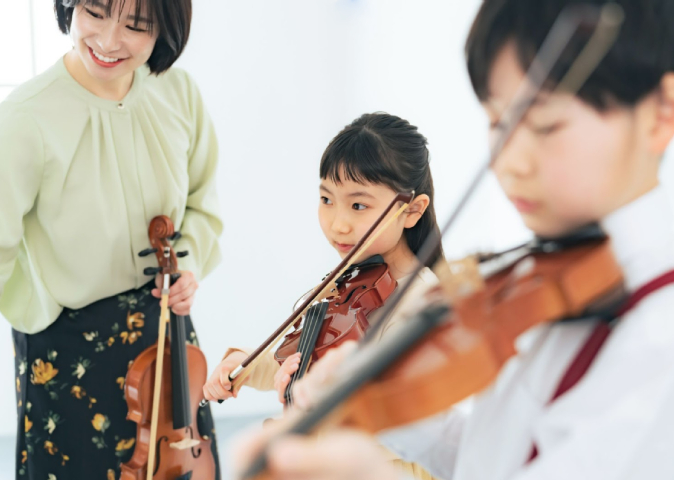“Highly Connected Brain – Music Education in Young Children”
We have heard it all. Years of research has shown that music education raises intelligent quotient (IQ) and improves math and reading etc. But do we truly understand the impact of music education, and why it is important to start at a young age? If we observe young children, they often make sounds and like to sing. Until they become more self-conscious and start to understand what is socially accepted and what is not. A study showed that babies between the age 1 to 3 days old, use the music processing areas in the brain to listen to their mothers’ speeches. This shows that music and language processing are closely related in the brain, and that we express and understand the world in “musical terms”.
Music education benefits all ages. But particularly for young children who start below the ages of 7, they enjoy an average of 7.5 IQ points higher than those without formal music education. Start your child’s music education today, from as young as 3 years old. Studies have shown that listening to music activate many different parts of the brain, but playing music shows even greater brain activity particularly in the audio, visual and motor cortices, and an enhanced corpus callosum which plays a role in the communication between the two brain hemispheres. Many childhood disorders such as learning disorders and attention-deficit hyperactivity disorder (ADHD) etc. often involve implications in one of these four areas. Therefore, music education may be a possible solution to these issues.
The brains of young children are constantly changing and rapidly growing, and susceptible to whatever they are exposed to. Therefore, music education in the early childhood years and its reaped benefits, impact later adulthood years. In this process, children also develop important traits that are critical for future successes. According to Super’s Model of Career Development in Children, curiosity is a fundamental drive, which is met through exploration, that leads to information acquisition. This leads to achievements in developmental milestones, and the development of interests and self. Music education supports this process.
Playing of music involves attention to detail, patience, planning and strategizing, creating, understanding the emotional content while simultaneously analysing the cognitive aspects and meaning-making. It involves coordination and fine motor skills which involve the mathematical precision of the left brain, combined with the artistic and intuitive aspects of the right brain[3]. With music education, children are more creative, with better executive and memory functions. Disciplined practice allows children to be comfortable with the uncomfortable. Brain maturation is one of the critical developmental milestones:
- The frontal lobe is critical for executive functions, which grows and changes rapidly between ages 3 to 15.
- The Executive functions for young children include delaying of gratification, cognitive inhibition and flexibility; skills which are critical for academic successes.
- Short-term memory and memory accuracy also improve in this stage.
There are generally two ways to learn music, one through enculturation, which involves learning through experience and observation, and another through formal music education. Three factors have been identified as critical for the said benefits:
- Intensity of the training
- Duration of the training
- Young age when the training commenced.
Music LifeStyle Academy is the place where the love of music begins. It is a music school that goes beyond the imparting of music education. Young children, all the way to older adults are presented with opportunities to learn, whether their goals are professional musical qualifications or simply to play as a form of self-expression.
The academy does more than imparting the theoretical and practical aspects of music education. It provides the all-rounded experience, opportunities of playing in an ensemble, participating in recitals, charity concerts and public performances, opportunities for music and cultural exchanges in foreign countries and exposure to the various experts in this field. These are rare opportunities for major learning and personal growth.
It is located at The Central, Clark Quay and has been around since 2010 and was founded by Kellyn Quek, B.A. Hons MUS from Kingston University (London UK) and Dr.AykeAgus (former Professor at The Juilliard School of Music). The teachers come from all around the world, bringing with them their expertise and real-life experiences as a performer and teacher into the classroom setting.
The wide-spread offering of classes from piano to guitar to the violin, viola, cello, harmonica among many others, ensures that there is something for everyone. For more information to get your child started on this musical journey, enquire about the Young Musician Courses, ages 3 and above.
With all the researches done, we shall all conclude that it is very important for music as part of early childhood development.
At the academy, we provide highly qualified well-trained early childhood pedagogy music educators who are able to embark children in an inspiring and encouraging music learning journey!
Recommended references:
- https://www.youtube.com/watch?v=ueqgenARzlE
- https://www.ted.com/talks/anita_collins_how_playing_an_instrument_benefits_your_brain?language=en
[1] Collins, A. (2014, October 27). What if every child had access to music education from birth? [Video file]. Retrieved from: https://www.youtube.com/watch?v=ueqgenARzlE.
[2] Sharf, R. S. (2013). Applying career development theory to counselling. (6th ed.). Pacific Grove, CA: Brooks/Cole.
[3] TED-Ed. (2014, July 22) How playing an instrument benefits your brain – Anita Collins [Video file]. Retrieved from: https://www.youtube.com/watch?v=R0JKCYZ8hng&t=96s.
[4] Ilari, B. (2013, March 14) Music & the young brain: Beatriz Ilari at TEDxYouth@Caltech [Video file]. Retrieved from: https://www.youtube.com/watch?v=eLQbqXJF-2M.









